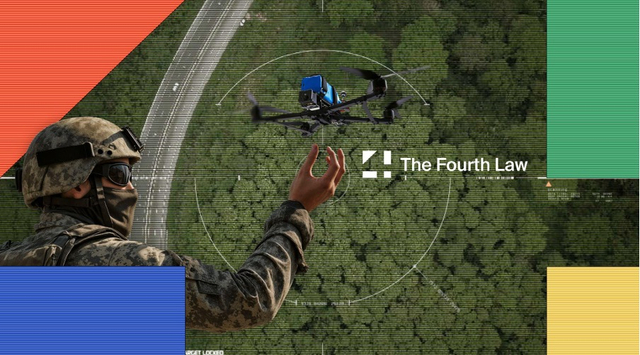
The Fourth Law (TFL), a Ukrainian company developing autonomy systems for first-person view (FPV) drones, announced its first round of investment from a group of venture funds and angel investors based in the EU, US and Canada.
“And even a bit from Ukraine,” TFL’s founder Yaroslav Azhnyuk wrote in his LinkedIn post announcing the investments.
JOIN US ON TELEGRAM
Follow our coverage of the war on the @Kyivpost_official.
TFL plans to allocate the funds to improve the “last mile” autonomy – the technology that enables FPV drones to home in on their targets automatically using artificial intelligence (AI).
In the case of TFL, the pilot transfers control of the drone to an onboard computer running AI algorithms in the last 500 meters (546 yards) of its flight, TFL wrote.
The startup did not disclose the investors or the size of the investment in its press release.
TFL said its solutions increase the hit rate without a drastic increase in costs.
“The company’s first products, the TFL-1 autonomy module, and the Lupynis-10-TFL-1 UAS (daytime or nighttime) – increase the success of FPV drone missions by a factor of 2-5 times, while increasing their cost by just 10-20%,” TFL wrote.
According to its website, the module costs between $150 and $620, with higher-end versions featuring thermal cameras produced by Odd Systems, another startup founded by Azhnyuk.
Prior to founding TFL and Odd Systems in 2023, Azhnyuk was also the founder of Petcube, Fuel Finance and Ozero Design – with Petcube being one of the top startups from Ukraine.
Other Topics of Interest
Russia’s ‘Nasty’ Info War: Bots Target Occupied Ukraine, New Report Finds
Ex-Ambassador exposes Kremlin hypocrisy as report details ‘ingenious’ Russian propaganda.
TFL said it is an autonomous robotics company that believes autonomous robots will play a key role in industries such as defense, transportation, agriculture, and construction by 2030.
AI-enabled ‘last mile’ module
The company told tech outlet DOU that the funding would be allocated to research and development (R&D), eventually bringing that autonomy to other types of drones.
TFL said its goal includes five levels of autonomy:
Terminal guidance Terminal guidance for bombing Target detection and engagement GPS-denied navigation Autonomous take-off and landing
The company said TFL-1 provides the first level of autonomy. In the future, the company aims to achieve full autonomy, encompassing everything from takeoff and navigation without GPS to the automatic detection and destruction of targets.
“Once that is achieved, second-order products become possible and viable for the modern military requirements, including drone swarms and nests, drone carriers, and fully autonomous interceptors of drones of different types,” TFL wrote.
TFL’s technology has been in frontline use since March 2025, deployed by the 58th Separate Motorized Infantry Brigade of Ukraine’s Armed Forces.
Apart from the AI solution, TFL also presented its own drone, the Lupinis-10-TFL-1, and an unmanned aerial system (UAS) consisting of a hundred 10-inch FPV drones with TFL-1-enabled autonomy, a ground control station, and support equipment.
These drones are capable of reaching targets within 30 kilometers (18.6 miles) with a payload of 1 kg (2.2 lbs), and a maximum payload of 3.5 kg (7.7 lbs) at shorter distances. Aside from the Lupynis platform, TFL-1 can be integrated into drones made by over a dozen major FPV drone manufacturers.
Image provided to Kyiv Post from The Fourth Law
TFL is not alone in this defense tech niche. Kyiv Post previously wrote about TAF Drones’ AI-enabled “last mile” module, which has been codified to meet NATO standards for military use and is soon ready for mass production.
While TFL’s module can chase targets at 80 kilometers per hour (50 miles per hour), TAF Drones’ module could do so at speeds of up to 120 kilometers per hour (74 miles per hour).
But TFL’s modules claim to be able to identify targets in variable lighting – for example, when a target moves through sunlight near a tree line – and can detect targets in hiding. TAF Drones did not say whether the startup’s solution offers the same capabilities.





